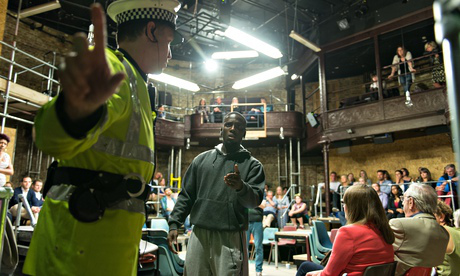Little Revolution review – revisiting the Hackney riots
While most of the country watched in disbelief at the riots on their television screens, Alecky Blythe headed out into Clapton armed with a Dictaphone, where she seized every chance to talk to those caught up in the events of August 2011.
The result of her recordings is Little Revolution, a completely verbatim play in which actors repeat dialogue transmitted to them through discreet earpieces. Blythe plays herself, one of a dozen professional actors, and is joined by a band of local volunteers who are the rioters, the ‘disaffected youth’ and awe-struck bystanders.
The audience surrounds the stage (there’s no neat division of ‘them and us’) and in riot scenes hoodied hordes scuttle in and out with stolen goods in blue carrier bags. Blythe intersperses rioting and vox-popped observations from the sidelines with her main narrative focus: the looting of a shop on Clarence Road which puts its owner, Siva, out of business.
Clapton Square couple Sarah and Tony hatch a plan to put Siva back in business, and enlist the help of Father Rob Wickham and Councillor Ian Rathbone. But the attempt to heal an open wound using the sticking plaster of a community tea party (sponsored by M&S) only highlights division between “the two sides of the road”.
Imogen Stubbs is liberal Sarah, one of a clutch of biggish names in the cast including Ronni Ancona as market trader Jane and Game of Thrones’ Lucian Msamati as Colin, the enigmatic barber who speaks of a “little revolution…[that] hasn’t stopped here yet.”
While the Clapton Square group hogs the headlines (to the delight of Councillor Rathbone, played with a merciless sense of buffoonery by Barry McCarthy), another campaign Stop Criminalising Hackney Youth, started by residents of Pembury Estate, makes little to no headway. “Their babies are already going to turn out to be criminals,” dismisses one passerby.
Blythe, all the while, hears and records all, the glue between disparate scenes, though she’s more our bumbling guide than intrepid explorer, prone to nervous laughter and tomfoolery.
The Tricycle in Kilburn long ago offered its own verbatim take on the riots, but Little Revolution tries a different tack, focusing more on this fractured notion of ‘community’, a word tarnished by inequality. From a playwright who herself braved the riots, Little Revolution is a brave and important play.
Little Revolution is at the Almeida Theatre, Almeida Street, N1 1TA until 4 October.

